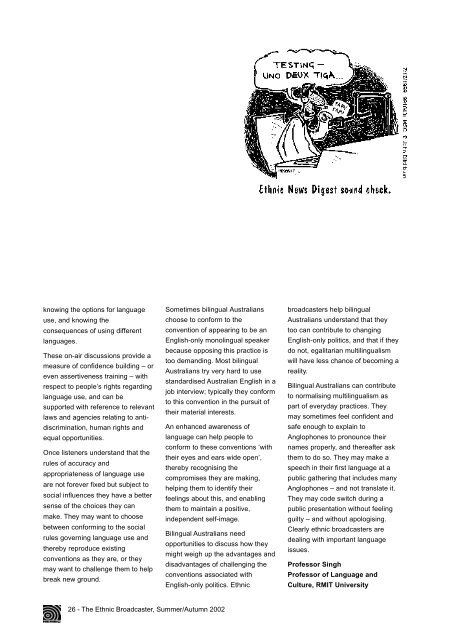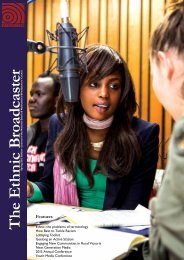diverse voices: new skills - National Ethnic and Multicultural ...
diverse voices: new skills - National Ethnic and Multicultural ...
diverse voices: new skills - National Ethnic and Multicultural ...
You also want an ePaper? Increase the reach of your titles
YUMPU automatically turns print PDFs into web optimized ePapers that Google loves.
knowing the options for language<br />
use, <strong>and</strong> knowing the<br />
consequences of using different<br />
languages.<br />
These on-air discussions provide a<br />
measure of confidence building – or<br />
even assertiveness training – with<br />
respect to people’s rights regarding<br />
language use, <strong>and</strong> can be<br />
supported with reference to relevant<br />
laws <strong>and</strong> agencies relating to antidiscrimination,<br />
human rights <strong>and</strong><br />
equal opportunities.<br />
Once listeners underst<strong>and</strong> that the<br />
rules of accuracy <strong>and</strong><br />
appropriateness of language use<br />
are not forever fixed but subject to<br />
social influences they have a better<br />
sense of the choices they can<br />
make. They may want to choose<br />
between conforming to the social<br />
rules governing language use <strong>and</strong><br />
thereby reproduce existing<br />
conventions as they are, or they<br />
may want to challenge them to help<br />
break <strong>new</strong> ground.<br />
Sometimes bilingual Australians<br />
choose to conform to the<br />
convention of appearing to be an<br />
English-only monolingual speaker<br />
because opposing this practice is<br />
too dem<strong>and</strong>ing. Most bilingual<br />
Australians try very hard to use<br />
st<strong>and</strong>ardised Australian English in a<br />
job interview; typically they conform<br />
to this convention in the pursuit of<br />
their material interests.<br />
An enhanced awareness of<br />
language can help people to<br />
conform to these conventions ‘with<br />
their eyes <strong>and</strong> ears wide open’,<br />
thereby recognising the<br />
compromises they are making,<br />
helping them to identify their<br />
feelings about this, <strong>and</strong> enabling<br />
them to maintain a positive,<br />
independent self-image.<br />
Bilingual Australians need<br />
opportunities to discuss how they<br />
might weigh up the advantages <strong>and</strong><br />
disadvantages of challenging the<br />
conventions associated with<br />
English-only politics. <strong>Ethnic</strong><br />
26 - The <strong>Ethnic</strong> Broadcaster, Summer/Autumn 2002<br />
broadcasters help bilingual<br />
Australians underst<strong>and</strong> that they<br />
too can contribute to changing<br />
English-only politics, <strong>and</strong> that if they<br />
do not, egalitarian multilingualism<br />
will have less chance of becoming a<br />
reality.<br />
Bilingual Australians can contribute<br />
to normalising multilingualism as<br />
part of everyday practices. They<br />
may sometimes feel confident <strong>and</strong><br />
safe enough to explain to<br />
Anglophones to pronounce their<br />
names properly, <strong>and</strong> thereafter ask<br />
them to do so. They may make a<br />
speech in their first language at a<br />
public gathering that includes many<br />
Anglophones – <strong>and</strong> not translate it.<br />
They may code switch during a<br />
public presentation without feeling<br />
guilty – <strong>and</strong> without apologising.<br />
Clearly ethnic broadcasters are<br />
dealing with important language<br />
issues.<br />
Professor Singh<br />
Professor of Language <strong>and</strong><br />
Culture, RMIT University




